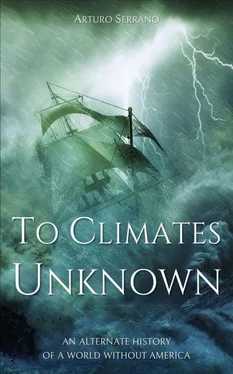Arturo Serrano - To Climates Unknown - An Alternate History of a World Without America
Здесь есть возможность читать онлайн «Arturo Serrano - To Climates Unknown - An Alternate History of a World Without America» весь текст электронной книги совершенно бесплатно (целиком полную версию без сокращений). В некоторых случаях можно слушать аудио, скачать через торрент в формате fb2 и присутствует краткое содержание. Город: Bogot,a, Год выпуска: 2021, ISBN: 2021, Издательство: Amazon, Жанр: Альтернативная история, на английском языке. Описание произведения, (предисловие) а так же отзывы посетителей доступны на портале библиотеки ЛибКат.
- Название:To Climates Unknown: An Alternate History of a World Without America
- Автор:
- Издательство:Amazon
- Жанр:
- Год:2021
- Город:Bogot,a
- ISBN:979-8-75808-648-3
- Рейтинг книги:3 / 5. Голосов: 1
-
Избранное:Добавить в избранное
- Отзывы:
-
Ваша оценка:
- 60
- 1
- 2
- 3
- 4
- 5
To Climates Unknown: An Alternate History of a World Without America: краткое содержание, описание и аннотация
Предлагаем к чтению аннотацию, описание, краткое содержание или предисловие (зависит от того, что написал сам автор книги «To Climates Unknown: An Alternate History of a World Without America»). Если вы не нашли необходимую информацию о книге — напишите в комментариях, мы постараемся отыскать её.
To Climates Unknown: An Alternate History of a World Without America — читать онлайн бесплатно полную книгу (весь текст) целиком
Ниже представлен текст книги, разбитый по страницам. Система сохранения места последней прочитанной страницы, позволяет с удобством читать онлайн бесплатно книгу «To Climates Unknown: An Alternate History of a World Without America», без необходимости каждый раз заново искать на чём Вы остановились. Поставьте закладку, и сможете в любой момент перейти на страницу, на которой закончили чтение.
Интервал:
Закладка:
They were alone in the box, but Kristina waited until the public seemed sufficiently enraptured before she leaned to her side and whispered in Latin, “Now what is this nonsense about Margrete?”
Leonora had alluded to Queen Margrete, who three centuries earlier had ruled all the Scandinavian nations from a single throne. That was the magnitude of the news she was bringing. She waited until the music grew louder again and replied in Latin, “Frederik knows of Your Majesty’s change of heart.”
A shift in Kristina’s posture told her all she needed. She expected the king to say something, but the topic was delicate: Sweden was the most valuable ally of the Canutic Empire in the ongoing war against the Holy Roman Empire. Sweden was supposed to be fighting on the side of Protestantism, but suspicions had started to circulate about Kristina’s crypto-Catholic tendencies. The mere mention of Margrete sufficed to hint at what Frederik was willing to do to stop Kristina’s conversion.
Seeing that the king was still lost in thought, Leonora pressed on, “Your Majesty is being watched closely. It has been that way for a long time. What has been said about my husband does not entirely match the truth.”
Kristina turned her head to look directly at Leonora. “As much as I like diplomacy, I have no patience for games and innuendo. What is it that you know?”
Leonora felt too exposed speaking in a theater, but the music gave her sufficient cover. “More things are happening than Your Majesty knows. Denmark has changed. I’ve become aware of plans to shape the entire landscape of Europe. It was my father, for instance, who sabotaged Your Majesty’s attempt at peace.”
“Be direct,” insisted the king.
With a trembling voice, Leonora spoke a forbidden name. “Johan Salvius.”
“What about him?” Kristina looked straight ahead, refusing to reveal any feeling, but Leonora was not deceived. Sweden’s envoy at the talks at Osnabrück had been Europe’s last hope to put an end to the wars of religion, but he never had the chance to fulfill his assignment; his ship had sunk before reaching the German coast.
Leonora leaned closer. “I was present at the war room when my father gave the order to destroy his ship.”
Kristina’s hands curled into fists. “What?”
“I can’t disclose everything I know. I’m still a patriot, despite what people like to make up about me. But I can say this much: Denmark is able to sink any ship at sea.”
“I’ve heard the legend. The Hafgufu has been summoned. Is it true?”
“After a fashion. My father used it against your envoy to keep the war going.”
“Danish soldiers have fought side by side with mine. Why would Christian ruin the peace talks?”
“His goals were different from Your Majesty’s. After he got his hands on the Hafgufu, his outlook on the war changed. A compromise under which Catholics could keep their kingdoms unopposed was the last thing he wanted. He would rather keep throwing soldiers’ lives at the rest of Europe if that meant denying the Holy Emperor one day of rest.”
“How long has this been happening?”
“It began much before the peace talks. We were both children when my father conquered Normandy.”
Kristina nodded. The annexation of Normandy in 1631 had been a powerful gesture, an explicit reclamation of ancient Viking territory. “Did he use the Hafgufu in that campaign?
“Yes, but the sole reason was to distract Richelieu from the alliance he was trying to make with Your Majesty.”
“Your father’s spies heard of it?”
“He said he’d never allow a Catholic to be our ally, even against the Holy Emperor.”
Kristina put her hands on her face. “Religious war is going to be our ruin.” Then she saw more clearly her own situation. “Does your brother feel that way about me?”
“Yes.” Leonora was afraid of saying more, and remained silent until the first act ended and the public started clapping. “Your Majesty’s objections to the Lutheran faith have been known for many years. In particular, the Danish navy has been paying attention to the scholars Your Majesty has been inviting to teach at court.”
“They have been targeting scholars?”
At the increased alarm in Kristina’s voice, Leonora remembered, This is a learned woman. Of course she cares more strongly about that. “It has been a policy of the Canutic Empire to keep Catholic preachers from setting foot in Sweden. Your Majesty is perceived as… sympathetic to their influence. So, from time to time, a ship sinks here, another there, and they all just happen to be carrying a missionary, or a confessor, or a Papal messenger. It’s never accidental.”
Realization put light in Kristina’s eyes. “And nobody pays attention because ships have been sinking everywhere.”
“That’s all Denmark’s doing. We’ve been hitting Spanish routes for decades. Honestly, if they’ve been able to afford to keep fighting us, it’s because we still can’t track every single galleon bringing them silver from Mexico.”
Kristina smiled. “It may surprise you to hear I’ve heard some scholars claim too much silver can hurt a kingdom.”
The tangent took Leonora by surprise. “I can’t see why.”
“Many don’t. But the explanation can wait. Is this all you’ve come to tell me?”
“I’m afraid not. To say the rest, I need a formal audience.”
“Can’t you speak while the play lasts?”
“I’ve brought someone who has news of other lands. Worse news.”
This time it was Kristina who felt the need to whisper. “Worse than Denmark taking over Sweden?”
“There’s so much more to take over.”
“As I said, can’t you tell me about it now?”
“As I said, more things are happening than Your Majesty knows. The information my guest has discovered is even more dangerous than anything I’ve said tonight.”
“Who needs so badly to talk to me?”
“The colonial governor of Nova Dania. The daughter of Jens Munk.”
Dawn, July 20 (Julian), 1651
Stockholm archipelago
As she paddled her way between the thousands of little islands that lay between Stockholm and the sea, Leonora was thinking of the enclosed space where she’d spent the past weeks and where Kathrine Munk was still waiting for the signal that it was safe to go out. Kathrine had been living inside a stolen submarine since the start of the year, traveling undetected to all corners of the world while her siblings ran the Munkhaven settlement at Hudson Bay, the same place that had almost killed her father three decades before. She’d needed their help with that arrangement while she gathered the evidence to unmask the scale of Denmark’s operations and the risk they posed for all nations. With Catholic Europe firmly in the grip of superstition, Kristina was the only ruler clear-headed enough to understand their report of what was happening and powerful enough to do something about it.
Leonora’s rowboat reached their rendezvous point between three unpopulated islets of the unimaginably vast and intricate archipelago where Stockholm was all but hidden. She extended a hand to tap six times at a metallic object sculpted and painted to look like the bloated corpse of a seagull. It not only showed the submarine’s position, but also kept its occupants alive. At full capacity, a submarine of the Danish Secret Navy was able to maintain thirty rowers for two months before needing to resurface for clean water; human waste could be released directly into the sea via two airtight doors, whose design had required rapid advancement in the techniques of sealing wooden surfaces with tar. Procuring food was as easy as fishing; air, however, was still an unsolved problem. By heating saltpeter, as taught by the alchemist Sendivogius, Drebbel had found a way to replenish a few hours of life-giving air for a small vessel, but ships of the size that Christian wanted to use in war would have needed such large amounts of saltpeter that the furnaces would have ended up consuming the very substance they were trying to obtain. Instead, a system had been devised whereby an extendable pipe was raised to the surface and allowed to stay open for a few minutes. Its end was always shaped deceptively: a piece of wood, a clump of seaweed, a shoe. Since the creation of this new navy, Christian had intuited that the greatest portion of its success would depend on keeping its existence unknown. The same careful approach under Frederik’s rule was proving lethal for Spanish sailors. But one problem of having a fleet of undetectable ships was that, when the empire lost track of one, it was never certain whether it was due to a faulty airlock, a fire, a bout of scurvy, a broken breathing pipe, a lucky cannon ball from a Spanish galleon, or a determined thief.
Читать дальшеИнтервал:
Закладка:
Похожие книги на «To Climates Unknown: An Alternate History of a World Without America»
Представляем Вашему вниманию похожие книги на «To Climates Unknown: An Alternate History of a World Without America» списком для выбора. Мы отобрали схожую по названию и смыслу литературу в надежде предоставить читателям больше вариантов отыскать новые, интересные, ещё непрочитанные произведения.
Обсуждение, отзывы о книге «To Climates Unknown: An Alternate History of a World Without America» и просто собственные мнения читателей. Оставьте ваши комментарии, напишите, что Вы думаете о произведении, его смысле или главных героях. Укажите что конкретно понравилось, а что нет, и почему Вы так считаете.












